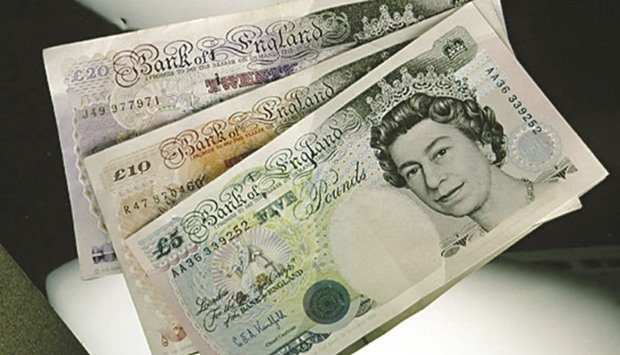The British pound slumped to a three-year low against the euro and fell against the dollar yesterday after Prime Minister Theresa May said Brexit negotiations would begin by March.
Better-than-expected British manufacturing data, ironically thanks to recent strong falls for the pound, however helped London’s benchmark FTSE 100 stocks index to close 1.2% higher at 6,983.52 points.
Sterling dropped to 87.46 pence against the euro, the lowest level since August 2013, after May gave more details over the weekend about how Britain would exit the European Union.
“While the latest dip in sterling has partly reflected concerns over the prospect of a ‘hard Brexit’, the currency’s depreciation should continue to cushion the economic impact of the vote to leave the EU,” Capital Economics’ Jonathan Loynes said in an investors’ note.
The pound also slid to a three-month low of $1.2846 — before recovering against both the dollar and euro.
The pound has faced severe pressure on currency markets since Britain voted in June to leave the EU — handing a boost to the country’s exporters.
In a key indicator of the strength of the manufacturing sector, the Markit/CIPS UK manufacturing PMI (purchasing managers’ index) rose to its highest level since mid-2014, according to figures yesterday.
“It is apparent that sterling’s marked weakening is giving an important lift to foreign demand for UK manufactured goods,” said Howard Archer, chief European economist at IHS Global Insight.
The pound struck a 31-year low against the dollar in the immediate wake of the Brexit vote, at $1.2798.
Before now, May had only said that Britain would not trigger Article 50 of the EU’s Lisbon Treaty — which sets a maximum two-year clock ticking until a country’s departure from the 28-member bloc — before the end of this year.
In the eurozone, the Paris CAC 40 closed 0.1% higher at 4,453.56 points, while Frankfurt was shut owing to a public holiday in Germany. The Euro Stoxx 50 closed down 0.1% at 2,998.56 points.
Dutch bank ING became the latest lender yesterday to announce plans to shed some 7,000 jobs, mainly in Belgium and The Netherlands, sending its shares 1.0% lower on the Amsterdam stock exchange.
In other currency news, the Colombian peso fell to its lowest level since September 16 after voters rejected a peace deal between the government and communist Farc rebels.
Wall Street dropped ahead of a US jobs report and the annual meeting of the International Monetary Fund later this week.
Asian stock markets closed higher with financials up on easing fears about the future of German giant Deutsche Bank after a source said it was nearing a deal to slash a multi-billion-dollar US fine.

Sterling dropped to 87.46 pence against the euro, the lowest level since August 2013, after Prime Minister Theresa May gave details about how Britain would exit the EU.
